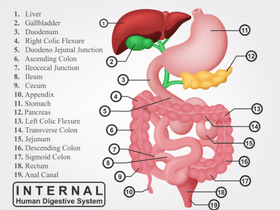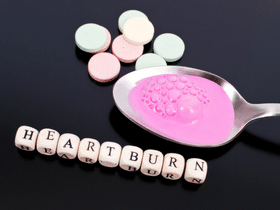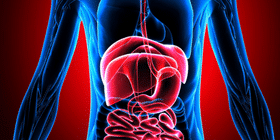Most people experience digestive problems—whether it’s an upset stomach, heartburn, or diarrhea—from time to time.
Often, these digestive problems aren’t serious. They either go away on their own or can be managed with over-the-counter medication or lifestyle changes.
The following article can help you to understand more about your digestive tract, including why symptoms arise, and how you can address them with the help of your doctor or pharmacist.
The Gastrointestinal Tract

When most of us think of digestion, we think of the stomach. But in fact, the stomach is only one component of a complex system of organs.
Together, these organs allow your body to ingest, breakdown, and absorb food so that you can get all the vitamins and nutrients you need, while also eliminating waste.
You might be surprised to learn that digestion actually begins in the mouth, where saliva works to break down food as you chew.
Next, you swallow, and food moves to the esophagus, a narrow tube which connects your throat to your stomach.
At the bottom of the esophagus, a sphincter muscle opens to allow food to pass into the stomach, where acids break it down further.
Next, food passes from the stomach to the small intestine. Here, digestive juices from organs such as the pancreas and gallbladder break food matter down even further.
Nutrients are also absorbed in the small intestine.
The leftover matter from the small intestine is pushed through to the large intestine, which then soaks up water and pushes waste through the rectum and out the anus.
Naturally, problems can occur at any stage in the process, resulting in uncomfortable or embarrassing symptoms.
The good news is that a lot of digestive symptoms can be alleviated with simple diet and lifestyle changes.
If problems are severe or persistent, though, they might warrant an appointment with a gastroenterologist.
Gastroenterologists are doctors who specialize in the gastrointestinal tract as well as solid organs involved in digestion such as the liver, pancreas, and gall bladder.
Read on to learn how you can address common digestive issues and when you should see a doctor.
Heartburn and Acid Reflux

Heartburn is a burning sensation in the middle of the chest, which occurs when stomach acid rises up into the esophagus (acid reflux).
A lot of people experience heartburn and/or acid reflux from time to time.
Heartburn triggers include:
- greasy, spicy, or fatty foods,
- overeating
- lying down after a meal
- stress.
Fortunately, mild to moderate heartburn is easy to treat. Dietary changes can help, while over-the-counter medication can work to neutralize or reduce acid in the stomach.
You should see a doctor if you take medication for heartburn more than twice a week. Heartburn that occurs frequently may be a symptom of a long-term condition called acid reflux or GERD (gastroesophageal reflux disease).
Gas and Bloating
Gas buildup in the stomach and intestines can cause bloating, an uncomfortable sensation of swelling in the belly.
Bloating is more likely to occur among people who have irritable bowel syndrome, celiac disease, and stomach infections. And, also among women around and during menstruation.
Bloating is often uncomfortable, but it can also be painful. You can reduce bloating by cutting back on fatty or fried foods, avoiding carbonated drinks, drinking and eating slowly.
Quitting smoking, avoiding chewing gum, exercising more often, and limiting foods that cause gas, such as dairy products, cruciferous vegetables, or legumes may also help.
If they don’t, speak to a pharmacist about over-the-counter solutions such as lactase supplements for dairy intolerance, probiotics, simethicone, and alpha-galactosidase.
Diarrhea

Diarrhea can send you running to the bathroom with loose, watery stools, and may be accompanied by bloating, stomach pain, and abdominal cramps.
Diarrhea can be caused by many things, including what you eat.
Mild diarrhea usually isn’t a cause for concern. Getting enough fluids and food can help with dehydration, and also some over-the-counter medication is available for diarrhea.
Diarrhea that lasts for two or more days, as well as diarrhea accompanied by bloody stools, severe abdominal pain, fever, or dehydration, is serious. You should seek medical attention.
In addition, you should always contact a doctor if your infant or child has diarrhea.
Constipation
Bowel movement frequency varies from person to person. You probably have constipation if you have to strain and push to go to the bathroom.
Hard stools or a feeling of incomplete bowel movements are also an indication that you might be constipated.
There are many causes of constipation, including stress, diet, and taking certain medications. You can address constipation by:
- drinking more water
- eating more fruits and vegetables
- eating bran or prunes on a daily basis
- taking an over-the-counter medication
But you should see a doctor if your constipation persists for more than two weeks.
When to See a Doctor

Chronic or long-term digestive issues that refuse to go away with diet and/or lifestyle changes can be signs of something more serious.
Some common but potentially serious gastrointestinal disorders include:
- gastroesophageal reflux disease (GERD)
- celiac disease
- colitis
- Crohn’s disease
- ulcerative colitis
- irritable bowel syndrome (IBS)
- gallstones
- severe parasitic or viral infections.
These issues cannot be resolved without the help of a medical professional.
Seek medical attention right away if you experience abdominal pain, unintentional weight loss, or notice blood in your stool.
Taking Care of Your GI Tract
Your diet and lifestyle can help you to prevent digestive issues. Some of the most effective ways to avoid GI tract problems include:
- Getting enough fibre
- Limiting fatty and fried foods
- Drinking plenty of water
- Choosing lean meats and proteins
- Eating regular meals
- Staying active
- Avoiding bad habits such as cigarette smoking and consuming excess caffeine and alcohol
The information in this article should not be taken as professional medical advice. If you are having issues or have health-related concerns, you should see your personal physician
This page is also available in:
![]() English
English


